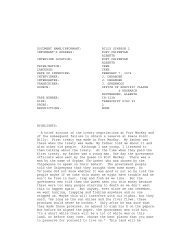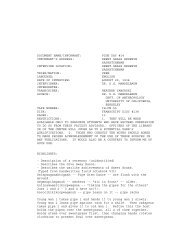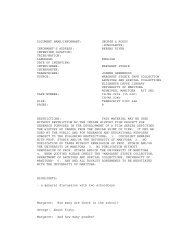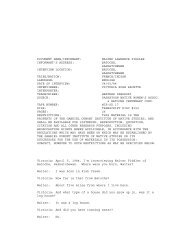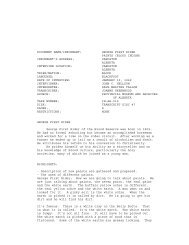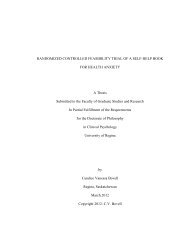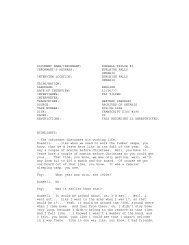Icon - DSpace - University of Regina
Icon - DSpace - University of Regina
Icon - DSpace - University of Regina
You also want an ePaper? Increase the reach of your titles
YUMPU automatically turns print PDFs into web optimized ePapers that Google loves.
Birth? Marriage? Promotion? Volunteer?<br />
What’s new with you?<br />
Share your news with your<br />
classmates and stay connected<br />
with Luther!<br />
Email: alumni@luthercollege.edu<br />
Visit: www.luthercollege.edu<br />
Write to:<br />
Alumni Relations Officer<br />
Luther College, U <strong>of</strong> R<br />
3737 Wascana Parkway<br />
<strong>Regina</strong>, SK S4S 0A2<br />
Larry Matthies BSc'79<br />
HIGH LIGHT<br />
If there ever was a U <strong>of</strong> R<br />
alumnus with an out-<strong>of</strong>this-world<br />
job, it's Larry<br />
Matthies BSc'79. Matthies is a<br />
computer scientist at the Jet<br />
Propulsion Laboratory (JPL) in<br />
Pasadena, Calif., the agency<br />
that manages the Mars<br />
Exploration Rover project for<br />
the National Aeronautics and<br />
Space Administration (NASA).<br />
Matthies leads a team <strong>of</strong><br />
scientists that developed the<br />
computerized vision system<br />
used by Spirit and Opportunity, the two robotic<br />
vehicles that rolled <strong>of</strong>f their landers in January to<br />
search for signs <strong>of</strong> life on the red planet.<br />
The image processing s<strong>of</strong>tware developed by<br />
Matthies' team was crucial to the Mars mission. First,<br />
the system was used to estimate the landing crafts'<br />
velocity and slow them, as necessary, for a safe<br />
landing. Secondly, the system was used to create a<br />
three-dimensional representation <strong>of</strong> the surface that<br />
allowed the rovers to safely navigate across the rocky<br />
Martian terrain.<br />
"For my group, our greatest fear was the failure <strong>of</strong><br />
the descent system because it's mission-critical,"<br />
explains Matthies. "The reconstruction they did after the<br />
landing <strong>of</strong> Spirit suggested that if that system hadn't<br />
worked we might have landed too hard on the surface."<br />
Although he earned his BSc in computer science with<br />
distinction, Matthies was no one-trick pony. When he<br />
wasn't busy learning he was involved in many<br />
extracurricular activities including being involved in the<br />
computer science social club and serving as student<br />
representative to faculty senate, member-at-large <strong>of</strong> the<br />
Students' Union and chair <strong>of</strong> the U <strong>of</strong> R Debating Society.<br />
"Those things broadened my experience and made<br />
me a more well-rounded person," he says. "They gave<br />
me skills for things like giving presentations and<br />
running meetings. Those skills have been quite<br />
valuable along the way."<br />
Matthies says that robots with similar vision<br />
systems have military applications and could be used<br />
in hostage situations or in the aftermath <strong>of</strong><br />
earthquakes when searching collapsed buildings is too<br />
difficult or dangerous. As well, such robotic vehicles<br />
are used in automated mining operations and for<br />
automated cargo movement at shipping ports. Still,<br />
it's using the technology for deep space exploration<br />
that most intrigues Matthies.<br />
"To me, the two biggest questions are: Is there life<br />
elsewhere and why is there a universe in the first<br />
place?" Matthies says. "I'm very fortunate to help the<br />
scientists who are working to answer those questions."<br />
In early March, data collected by the rover<br />
Opportunity led scientists to conclude that the<br />
Martian surface once held an abundance <strong>of</strong> water and<br />
therefore may have been capable <strong>of</strong> supporting life as<br />
we know it.<br />
For more information visit the Mars Exploration Rover<br />
Mission Web site at:<br />
http://marsrovers.jpl.nasa.gov/home/index.html<br />
Spring 2004 THE THIRD DEGREE 9


